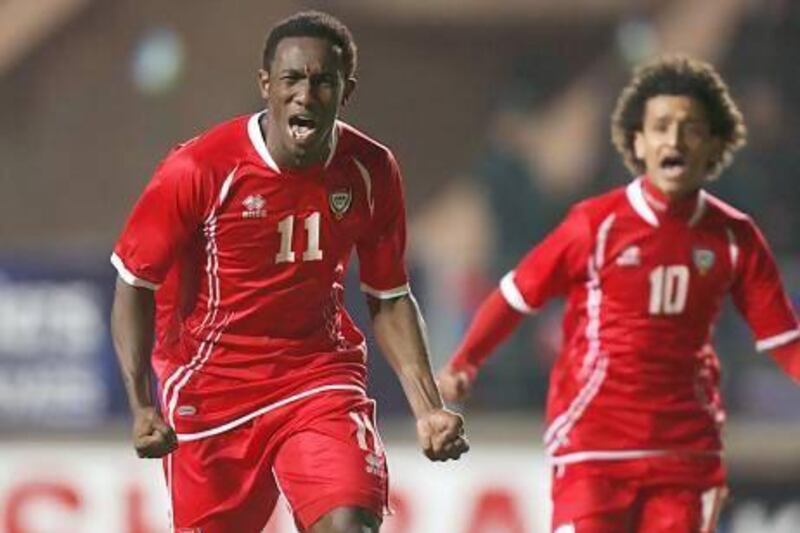The continued ascent of Omar Abdulrahman can fade even the most vibrant of memories, but it was not that long ago Ahmed Khalil was the darling of UAE football.
Cast the mind back as recently as 2008, before Al Ain's prodigious playmaker began to imprint heavily upon the country's consciousness, and it was his rangy counterpart at Al Ahli who carried all hope and every expectation.
A resplendent Asian Under 19 Championship reinforced his burgeoning reputation's authenticity; Khalil, then 17, returning from Saudi Arabia with a trio of trinkets in the championship trophy - he scored twice as the UAE defeated Uzbekistan in the final - the top scorer gong, and the award for Most Valuable Player. The recognition sustained with his decoration as the Asian Young Player of the Year.
"The whole nation is proud of him," said Mahdi Ali, at the time coach of the U19s. "This is just another feather in his cap. The boy has a great future ahead of him and he's surely going to win many more awards in the coming years."
Ivan Hasek, Khalil's manager at club level, was so enthused he declared his charge would be "the face of football in the UAE and a superstar for Ahli".
However, although he is still to celebrate his 22nd birthday, that potential remains largely unfulfilled: four Pro League seasons since have yielded fewer than 60 games - a large chunk as substitute - with his goal return a modest 19.
In truth, Khalil became a victim of his own success. Commitments were extended across three age-group national teams - he top scored at the 2010 U23 Gulf Cup, including the winner in the final, and notched six goals in four matches at that year's U19s Asian Cup - as well as domestic and Asian club commitments.
Burnout fostered a breakdown, the golden boy of the UAE's golden generation quickly dulled to leave a frequently leaden footballer with persistent injury and declining confidence.
We had been warned. Back in 2009, when wounded body deprived both the senior team and Ahli of Khalil's services, Hasek reiterated previous concerns.
"I said, 'You will kill him if you keep playing him in so many matches,'" the Czech said. "But nobody took heed and now he is injured all the time."
Still, a dedication to his country persisted - through to the 2010 Asian Games in China with effectively the 2012 Olympic team, then at a disappointingly sluggish Asian Cup in Qatar the following January. The crown, though, had begun to weigh long before.
"I know I've not done as well as I would've liked," Khalil said when the UAE bowed out at the quarter-finals of the 2010 Fifa U20 World Cup. "The problem is some people expect me to score every game, which is impossible."
Impossibilities were not confined to international football. That summer's arrival at Ahli of Grafite, the Brazilian of significant pedigree, limited Khalil's club contribution, while injuries, particularly muscle strains to the back and legs, took hold.
Yet the UAE's Olympics quest would again coax conviction, as two goals in five whirlwind minutes against Uzbekistan last March helped send his side to London. "I'm very happy for him," said Mahdi Ali, the coach. "It's time for him to come back to his level again."
Time seemed to stall that summer, though, as an increasingly frustrating season at Ahli spilt over to the national team. Despite a superb display in May's Etisalat Cup victory, Khalil found himself largely on the periphery, with Grafite and Luis Jimenez preferred in attack. A similar role at the Olympics threatened.
Mahdi Ali again showed faith, but Khalil stumbled; the forward floundered under the world's gaze when his teammates, and Abdulrahman in particular, flourished.
"He perhaps has not had the performance you would've wanted," said Dave Fenwick, a Dubai-based agent who had tipped Khalil to cause much commotion. "Yet he is one of the few in the team with the upper-body strength to play in one of the European Leagues … he might still be of interest."
To his credit, Khalil battled self-doubt to emerge a hero from January's Gulf Cup, highlighted by his last-gasp winner in the semi-final.
"We as players have always been confident in his abilities," said teammate Mohammed Ahmed after the Kuwait triumph.
A Gulf Cup winner's medal to add to the accolades, Khalil's latest comeback resonated at Ahli, too.
"I've talked about the importance of this for Ahmed and the opportunity it gives to prove himself and restore his confidence," said Quique Sanchez Flores, the coach, before signalling Khalil's importance to the club. "He's one of the best players not only in the UAE, but the region".
Whether or not Khalil ever makes that move outside of the country - he is contracted to Ahli until 2017 - his curious case reminds that a fine balance must be struck between club and country.
Although Abdulrahman continues to shine for both, the Al Ain star's omission through injury for tonight's Asian Cup qualifier provides Khalil another chance to exhibit his lustre. Perhaps for one night only, and against familiar foes in Uzbekistan, he can be the darling of UAE football once more.






